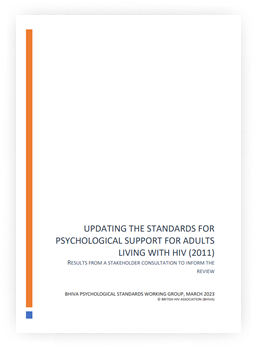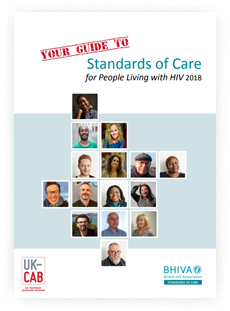A primary object of the association is the development and promotion of good practice in the treatment of HIV and HIV related diseases. To achieve this BHIVA has produced clinical guidelines on various aspects of the treatment and management of HIV infection and associated co-morbidities and has developed a national audit programme to audit the implementation of the guidelines at HIV treatment centres through out the UK.
To ensure the implementation of good practice and to ensure good clinical outcomes well organised services are essential. HIV has become a complex chronic medical condition and an increasing number of people are living with HIV infection through out the UK. It is essential there is equitable access to high quality HIV treatment and care services for individuals with HIV infection irrespective of where they live in the UK. Thus to compliment the BHIVA clinical guidelines the association also seeks to produce focused and auditable standards that address key aspects of the organisation of NHS clinical care for adults with HIV infection.
Updating the Standards for Psychological Support for Adults living with HIV (2011): Results from a stakeholder consultation to inform the review, March 2023
This stakeholder consultation was developed to inform an update to the Standards for psychological support for adults living with HIV published in 2011. Results demonstrate the clear progress in the biomedical model of HIV care has sadly not been matched by effective treatment for the mental health and wellbeing of people living with HIV.
The working group is developing updated standards, which will be launched in autumn 2024.

BHIVA Standards of Care for People Living with HIV 2018
The Standards are designed to provide a reference point against which to benchmark the quality of HIV care in the context of the changing needs of patients and the current financial pressures. They provide information to support top quality care and to inform commissioning decisions to meet the growing need for more efficient and cost-effective services. These Standards update earlier versions published in 2007 and 2013.
The new Standards are evidence based, and have been developed in partnership with care providers, professional associations, commissioners and people living with HIV. They cover the range of care needed from testing and diagnosis to the end of life, taking a holistic view of an integrated approach embracing overall health and well-being, as well as clinical care.
There are eight quality Standards, covering the care that any adult living with HIV in the UK should expect to receive. Each one presents a rationale, quality statements and measurable and auditable outcomes. Three new sections have been introduced looking at HIV prevention, stigma and well-being, and HIV across the life course.
"Your Guide to..." BHIVA Standards of Care for people living with HIV
The BHIVA Standards of Care were published in 2018. This is a valuable document, setting out the standards of care expected in the UK for people living with HIV. While the document is great for those delivering care, or commissioning care, the content can be quite challenging to understand for those receiving care – people living with HIV. This is, perhaps, the group that most needs to understand the standards.
With the support of BHIVA and a grant from the MAC AIDS Fund, a group from the HIV community have created "Your Guide to..." the BHIVA Standards. This looks at the standards from a patient perspective and highlights in plain language what a person living with HIV might reasonably expect to receive in terms of their care in the UK at all stages of their HIV journey. This was launched at the BHIVA Autumn Conference in November 2020.
The guide is available online: https://standards.bhiva.org
Please encourage your service users to go to this website for information about the standard of care that people living with HIV could expect to receive at any stage of their life. The website has the "Your Guide to..." information, as well as easy links to the full 2018 BHIVA Standards of Care for those who want more information. The website is designed to work on mobile devices as well as computers, and is easy to use and navigate.
Shared Care: how can we do it? Findings from the BHIVA Primary Care Project
There are around 104,000 people living with HIV in the UK and our clinical outcomes are among the best in the world. Almost half of those accessing care are now over 45 and age-related comorbidities such as hyperlipidaemia and hypertension are common. For those whose HIV condition is well controlled, these comorbidities may have a more significant impact on morbidity and mortality than HIV itself. More than ever, we now need to focus on holistic management of healthcare needs that addresses both HIV-related and non-HIV-related health conditions without losing the successes of HIV care. We believe that this can best be achieved by collaboration between primary and specialist care to provide a person-centred, rather than disease-specific, model of care across the life course. However, there is little evidence on how best we can achieve this.
To address this evidence gap, BHIVA commissioned a one-year programme of work with the overarching aim of informing commissioning and delivery of high-quality healthcare for people living with HIV between primary and specialist care across the life course.
We hope that by describing contemporary care models across the UK, matching them with evidence measuring service quality, and then sharing the successful care model configurations, we will support community-based care for people living with HIV through improved integration of care across both primary and specialist services.
HIV partner notification for adults: definitions, outcomes and standards 2015
HIV partner notification (PN) is a process in which contacts of people with HIV are identified and offered HIV testing. This strategy provides considerable opportunities to reach those at highest risk of HIV and reduce onward transmission through approaches such as post-(PEP) and pre-exposure prophylaxis (PrEP), and well established antenatal interventions. Thus effective HIV PN confers benefit to individual health by facilitating earlier diagnosis and linkage to care, and benefits public health by preventing the spread of infection. Achieving effective HIV PN can be challenging - less than 3% of the 4060 individuals newly diagnosed with HIV in a GUM clinic in 2013 are reported as being identified through PN (1). Around a fifth of new infections are recently acquired (1) and these individuals have high levels of viraemia, conferring much greater risk of transmission. There is therefore a pressing need to develop and maintain robust clinical and public health practice for HIV PN across the UK.
Standards for psychological support for adults living with HIV (2011)
Despite significant medical advances in HIV treatment, people living with HIV experience significantly higher rates of psychological difficulties than the general population. Psychological support improves both mental and physical health and reduces the risk of HIV transmission. Yet the availability and quality of psychological support for people living with HIV is currently variable.
These standards describe the support that all adults living with HIV should receive, from a wide range of professional groups, peers and informal providers, to enhance their mental health and their cognitive, emotional and behavioural wellbeing.




